Aldehyde and ketones are specially susceptible susceptible to nucleophile addition because carbonyl group _E01_580_Q01.png) (due to electronegatvity different between carbon and oxygen).
(due to electronegatvity different between carbon and oxygen).
_E01_580_Q02.png)
Positive charge on carbon makes it reactive towards the nucleophile. This addition is catalysed by acid. Reactivity of carbonyl compound towards nucleophilic addition increases in the electron deficience at carbonyl carbon. Thus, (-I.E.) group increase while (+I.E.) groups decrease the reactivity of carbonyl compound
Which among the following carbonyl compounds is most polar?
_E01_580_O01.png)
_E01_580_O02.png)
_E01_580_O03.png)
_E01_580_O04.png)
The correct Answer is:A
Topper's Solved these Questions
- ALKENE, ALKANE & ALKYNE BOOK - ALLENCHAPTER - ALKENE, ALKANE & ALKYNE EXERCISE - EXERCISE-4(A)
10 Videos
- ALKENE, ALKANE & ALKYNE BOOK - ALLENCHAPTER - ALKENE, ALKANE & ALKYNE EXERCISE - EXERCISE-4(B)
10 Videos
- ALKENE, ALKANE & ALKYNE BOOK - ALLENCHAPTER - ALKENE, ALKANE & ALKYNE EXERCISE - EXERCISE-1
119 Videos
- AIIMS 2019BOOK - ALLENCHAPTER - AIIMS 2019EXERCISE - CHEMISTRY
35 Videos
- ALKYL AND ARYL HALIDEBOOK - ALLENCHAPTER - ALKYL AND ARYL HALIDEEXERCISE - EXERCISE-05 (B)
37 Videos
Similar Questions
Aldehyde and ketones are specially susceptible susceptible to nucleophile addition because carbonyl group
_E01_581_Q01.png) (due to electronegatvity different between carbon and oxygen).
(due to electronegatvity different between carbon and oxygen).
_E01_581_Q02.png)
Positive charge on carbon makes it reactive towards the nucleophile. This addition is catalysed by acid. Reactivity of carbonyl compound towards nucleophilic addition increases in the electron deficience at carbonyl carbon. Thus, (-I.E.) group increase while (+I.E.) groups decrease the reactivity of carbonyl compound
Select the least reactive carbonyl compound for nucleophilic addition:
View SolutionAldehyde and ketones are specially susceptible susceptible to nucleophile addition because carbonyl group
_E01_579_Q01.png) (due to electronegatvity different between carbon and oxygen).
(due to electronegatvity different between carbon and oxygen).
_E01_579_Q02.png)
Positive charge on carbon makes it reactive towards the nucleophile. This addition is catalysed by acid. Reactivity of carbonyl compound towards nucleophilic addition increases in the electron deficience at carbonyl carbon. Thus, (-I.E.) group increase while (+I.E.) groups decrease the reactivity of carbonyl compound
Carbonyl compounds show nucleophilic addition with:
View Solution
Knowledge Check
Aldehyde and ketones are specially susceptible susceptible to nucleophile addition because carbonyl group
_E01_581_Q01.png) (due to electronegatvity different between carbon and oxygen).
(due to electronegatvity different between carbon and oxygen).
_E01_581_Q02.png)
Positive charge on carbon makes it reactive towards the nucleophile. This addition is catalysed by acid. Reactivity of carbonyl compound towards nucleophilic addition increases in the electron deficience at carbonyl carbon. Thus, (-I.E.) group increase while (+I.E.) groups decrease the reactivity of carbonyl compound
Select the least reactive carbonyl compound for nucleophilic addition:AC6H5−O∣∣C−C6H5BC6H5−O∣∣C−CH3CCH3−CH2−O∣∣C−CH2−CH3DAll are equally reactive.Aldehyde and ketones are specially susceptible susceptible to nucleophile addition because carbonyl group
_E01_579_Q01.png) (due to electronegatvity different between carbon and oxygen).
(due to electronegatvity different between carbon and oxygen).
_E01_579_Q02.png)
Positive charge on carbon makes it reactive towards the nucleophile. This addition is catalysed by acid. Reactivity of carbonyl compound towards nucleophilic addition increases in the electron deficience at carbonyl carbon. Thus, (-I.E.) group increase while (+I.E.) groups decrease the reactivity of carbonyl compound
Carbonyl compounds show nucleophilic addition with:AHCNBNaHSO3C(CH3OH+HCl)Dall of theseAldehyde and ketones are specially susceptible susceptible to nucleophile addition because carbonyl group
_E01_578_Q01.png) (due to electronegatvity different between carbon and oxygen).
(due to electronegatvity different between carbon and oxygen).
_E01_578_Q02.png)
Positive charge on carbon makes it reactive towards the nucleophile. This addition is catalysed by acid. Reactivity of carbonyl compound towards nucleophilic addition increases in the electron deficience at carbonyl carbon. Thus, (-I.E.) group increase while (+I.E.) groups decrease the reactivity of carbonyl compound
Which of the following is most reactve to give nucleophilic addition?AFCH2CHOBCICH2CHOCBrCH2CHODICH2CHO
Aldehyde and ketones are specially susceptible susceptible to nucleophile addition because carbonyl group
_E01_578_Q01.png) (due to electronegatvity different between carbon and oxygen).
(due to electronegatvity different between carbon and oxygen).
_E01_578_Q02.png)
Positive charge on carbon makes it reactive towards the nucleophile. This addition is catalysed by acid. Reactivity of carbonyl compound towards nucleophilic addition increases in the electron deficience at carbonyl carbon. Thus, (-I.E.) group increase while (+I.E.) groups decrease the reactivity of carbonyl compound
Which of the following is most reactve to give nucleophilic addition?
View SolutionAldehydes and ketones ar specially susecptible to nucleophilic addition because carbonyl group
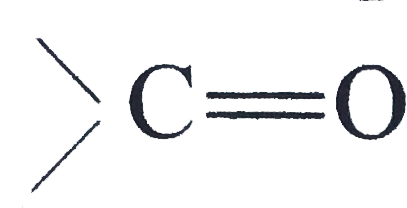 is polar (due to electronegativity difference between carbon and oxygen)
is polar (due to electronegativity difference between carbon and oxygen)
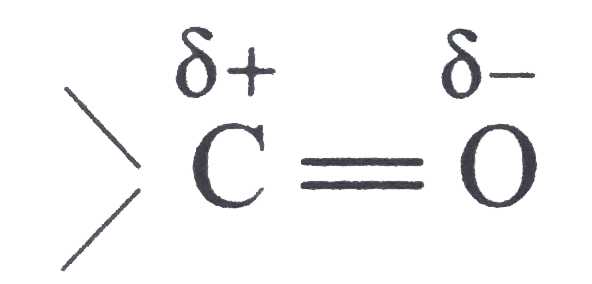
Positive charge on carbon makes it reactive towards the nucleophili. This addition is catalysed by acid.
Reactivity of carbonyl compound towards nucleophilic addition increases with increases in the electron deficiency at carbonyl carbon. Thus, (-I.E.)groups increase while (+I.E.) groups decrease the reactivity of carbonyl compound.
Which among the following isomeric compounds is most reactive?
View SolutionAldehydes and ketones ar specially susecptible to nucleophilic addition because carbonyl group
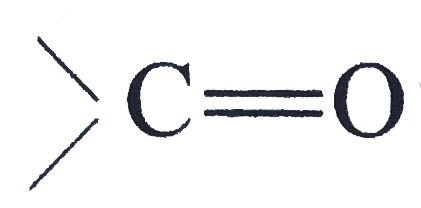 is polar (due to electronegativity difference between carbon and oxygen)
is polar (due to electronegativity difference between carbon and oxygen)
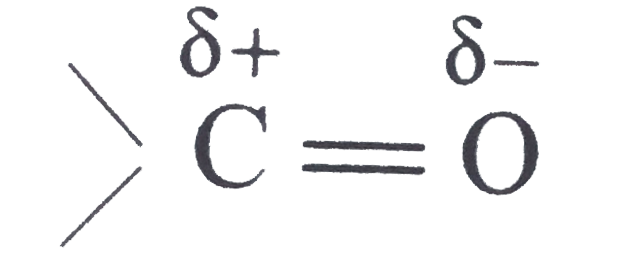
Positive charge on carbon makes it reactive towards the nucleophili. This addition is catalysed by acid.
Reactivity of carbonyl compound towards nucleophilic addition increases with increases in the electron deficiency at carbonyl carbon. Thus, (-I.E.)groups increase while (+I.E.) groups decrease the reactivity of carbonyl compound.
Which among teh following carbonyl compounds is most pola?
View SolutionAldehydes and ketones ar specially susecptible to nucleophilic addition because carbonyl group
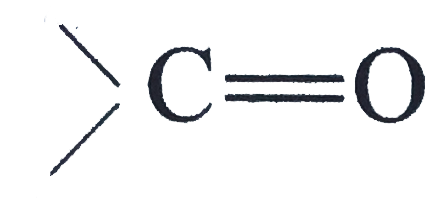 is polar (due to electronegativity difference between carbon and oxygen)
is polar (due to electronegativity difference between carbon and oxygen)
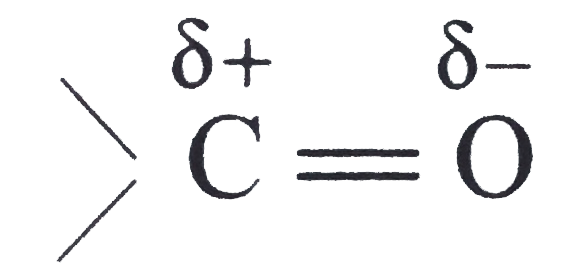
Positive charge on carbon makes it reactive towards the nucleophili. This addition is catalysed by acid.
Reactivity of carbonyl compound towards nucleophilic addition increases with increases in the electron deficiency at carbonyl carbon. Thus, (-I.E.)groups increase while (+I.E.) groups decrease the reactivity of carbonyl compound.
Which among the following is most reactive to give nucleophilic addtion ?
View SolutionAldehydes and ketones ar specially susecptible to nucleophilic addition because carbonyl group
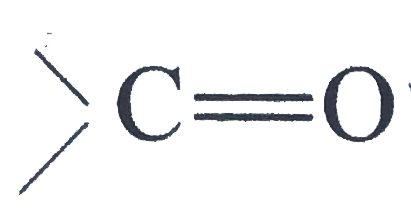 is polar (due to electronegativity difference between carbon and oxygen)
is polar (due to electronegativity difference between carbon and oxygen)
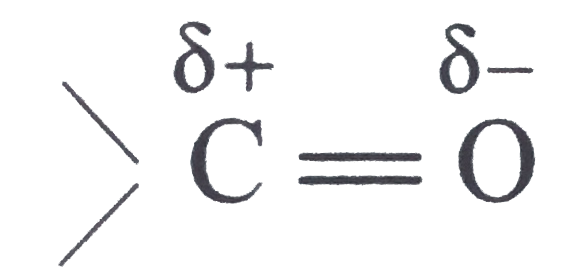
Positive charge on carbon makes it reactive towards the nucleophili. This addition is catalysed by acid.
Reactivity of carbonyl compound towards nucleophilic addition increases with increases in the electron deficiency at carbonyl carbon. Thus, (-I.E.)groups increase while (+I.E.) groups decrease the reactivity of carbonyl compound.
Select the least reactive carbonyl compound for nucleophilic addition :
View Solution
